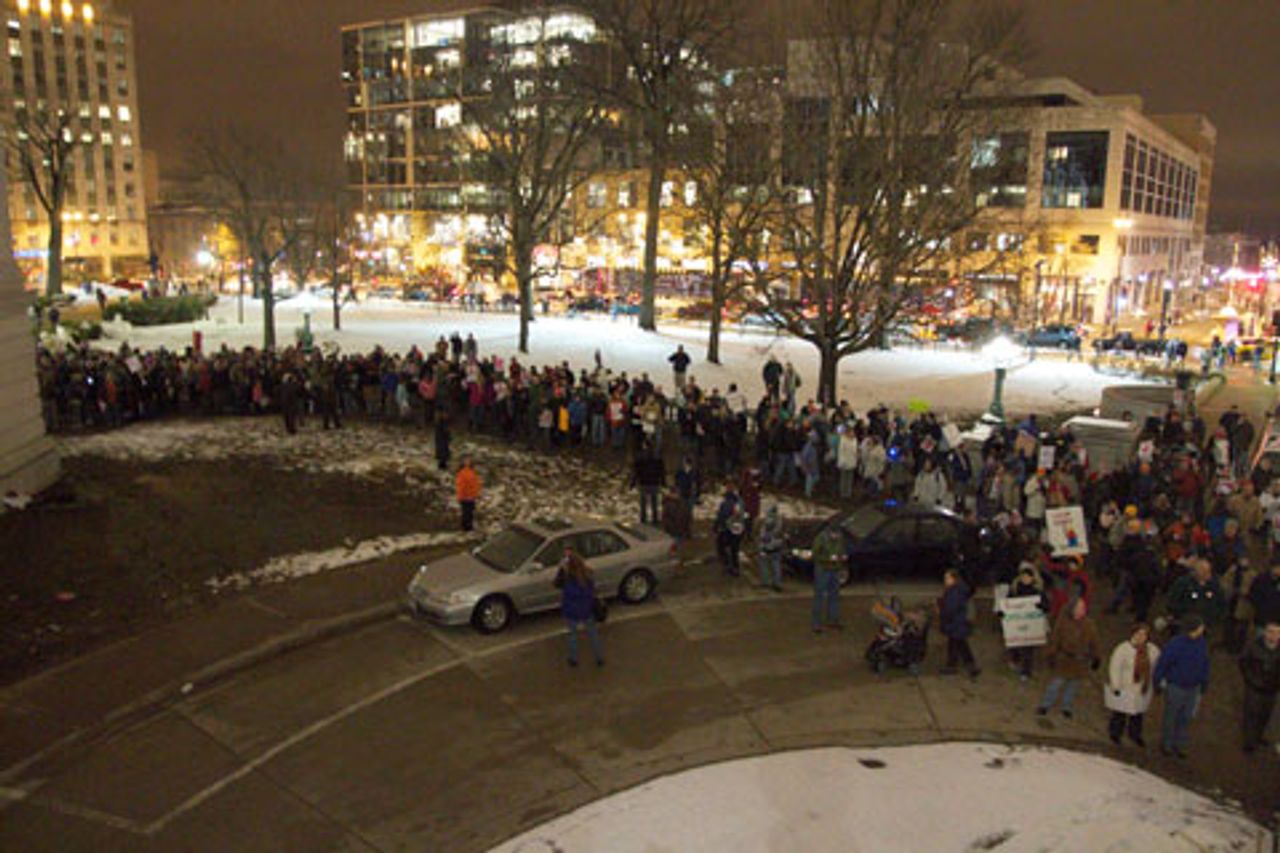 Protestors outside the capitol building Wednesday evening
Protestors outside the capitol building Wednesday eveningThe Republican-controlled Wisconsin Senate on Wednesday evening passed a bill stripping government workers of collective bargaining rights and forcing them to pay much more for health insurance and pensions. The bill was approved in spite of the absence of 14 Senate Democrats who had fled the state, legally depriving Republicans of the required two-thirds majority quorum for the vote to proceed.
The bill is expected to pass the State Assembly Thursday and be signed into law by Governor Scott Walker by the end of the week.
Republicans claimed legal grounds for the move by temporarily removing from the so-called “budget repair bill” its fiscal components. By doing so, Republicans said that the legislation was no longer a finance bill, and therefore not subject to the quorum requirement. It was a moment of baldfaced lying for Walker and Senate Republican leaders, who in every public statement have declared that the attack on collective bargaining rights was a fiscal matter.
The bill was passed without discussion or debate at about 6:30 p.m. by a hastily-convened special conference committee, which normally convenes to sort out differences in competing bills.
“Tonight, the Senate will be passing the items in the Budget Repair Bill that we can with the 19 members [present],” said Sen. Scott Fitzgerald, the chamber's Republican majority leader, in a statement announcing the move.
The vote was in evident violation of the Wisconsin Open Meetings Law, which requires that public notice of a meeting be made “24 hours prior to the commencement of such meeting unless for good cause such notice is impossible or impractical.”
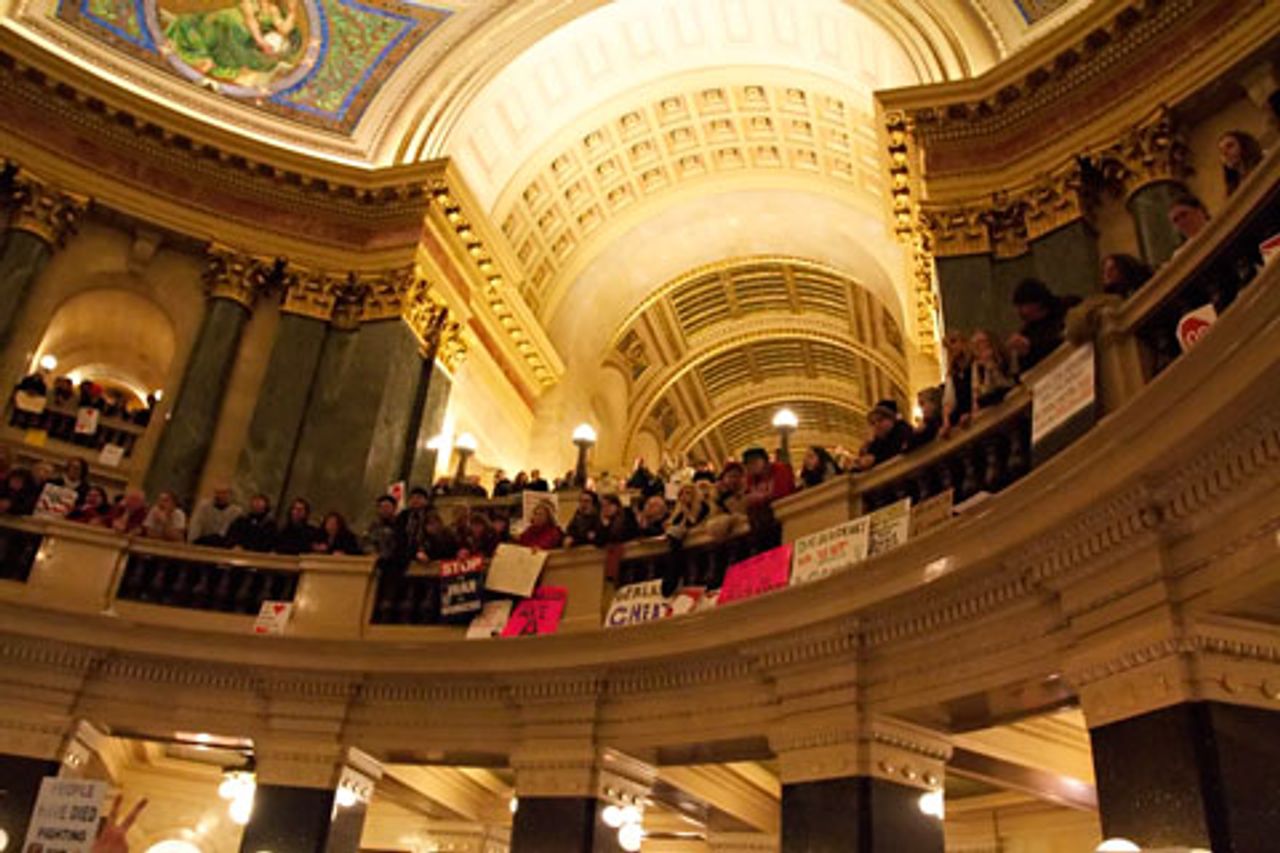 Demonstrators inside the capitol building
Demonstrators inside the capitol buildingThousands flooded to the capitol on hearing word of the bill’s passage. Crowds rushed the capitol building doors, shouting “you are cowards” and “let us in.” Chants of “general strike!” reverberated in and out of the building.
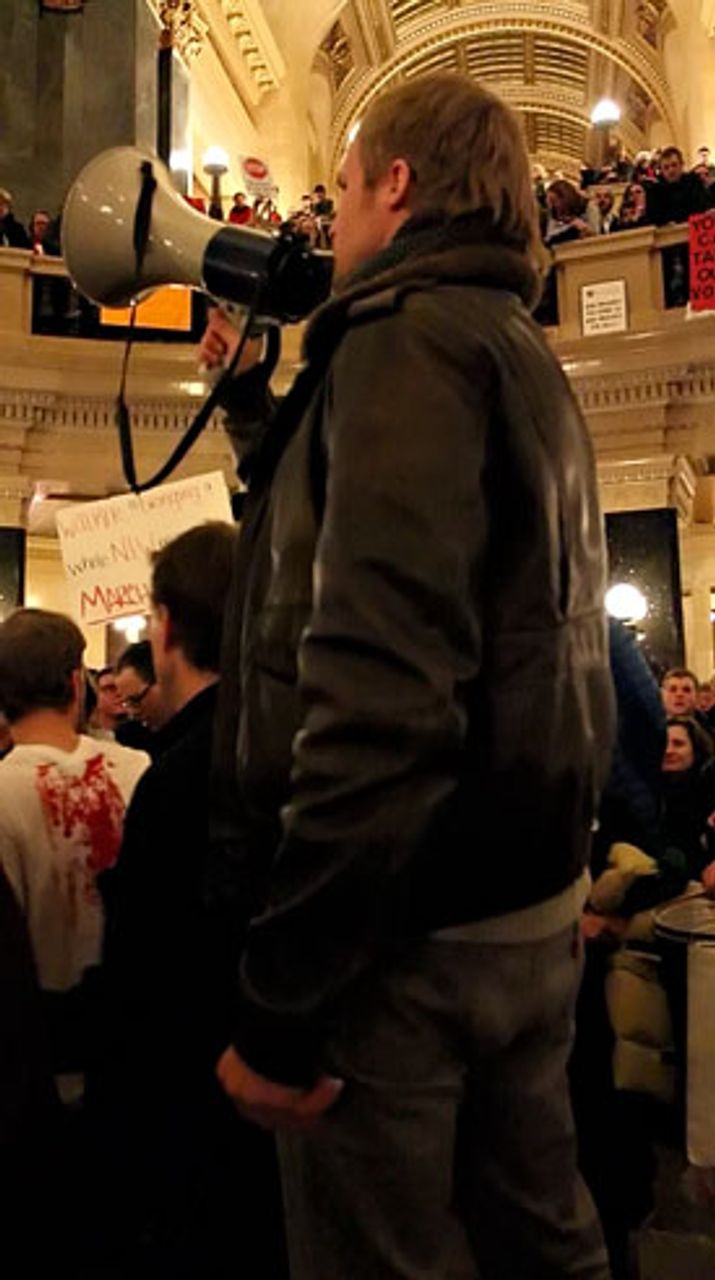 A Socialist Equality Party speaker addresses the
A Socialist Equality Party speaker addresses thecrowd in the capitol building
A Socialist Equality Party team was present at the scene. Andre Damon, a reporter for the World Socialist Web Site, was able to speak to thousands of demonstrators both inside and outside of the capitol building. He called for the formation of independent workplace committees to build for a general strike to force Walker out. These demands were met by enthusiasm among the workers present. (Download pdf, “Walker must go! For a general strike in Wisconsin”.)
Trade union officials and their supporters also attempted to address the spontaneous demonstration, including John Nichols of The Nation. They desperately sought to bolster illusions in the Democratic Party, praising the actions of the “Wisconsin 14” who had fled the state.
In fact, the bill’s passage reveals the consequences of the subordination of the mass struggle of Wisconsin workers and youth to the Democratic Party and the trade unions. From the beginning, the flight of the Democratic senators to Illinois was designed to take the initiative out of the hands of the government workers, students, and teachers, who had in the days preceding launched a “sick-out” strike wave against the bill that involved tens of thousands.
The Republicans’ legislative maneuver caught the Democrats flat-footed. Senate Democrats believed they were in advanced discussions with Walker to lessen the bill’s blow to union finances, while maintaining intact its cuts to worker benefits and workplace rights. E-mail exchanges between Walker’s office and Senate Democrats, released by the governor to the media, suggested that a deal was pending which would have required union certification elections every three years instead of each year, among other minor changes. This, Democrats hoped, would provide a degree of political cover for their capitulation—which was imminent, according to several media accounts.
Senator Bob Jauch, a recipient of of the e-mails, only yesterday hailed the communications as “the kind of starting point you can get to achieve a compromise.” The entire approach of the Democrats and the trade unions—that supposedly “wavering” Republicans could be swayed by pressure—has been exposed. The Republicans were far more determined than the “Wisconsin 14” Democrats, who always accepted the bill in principle, differing only with its aim of starving the unions of all dues revenue.
In the aftermath of the bill’s passage through the State Senate, efforts to bolster illusions in the Democrats will shift to the recall elections being launched against a number of Republican senators. Whatever the outcome of these elections, it will do nothing to reverse the assault on workers contained in Walker’s “budget repair bill” or his draconian two-year budget, which slashes Medicaid and public education, and moves toward the privatization of the University of Wisconsin.
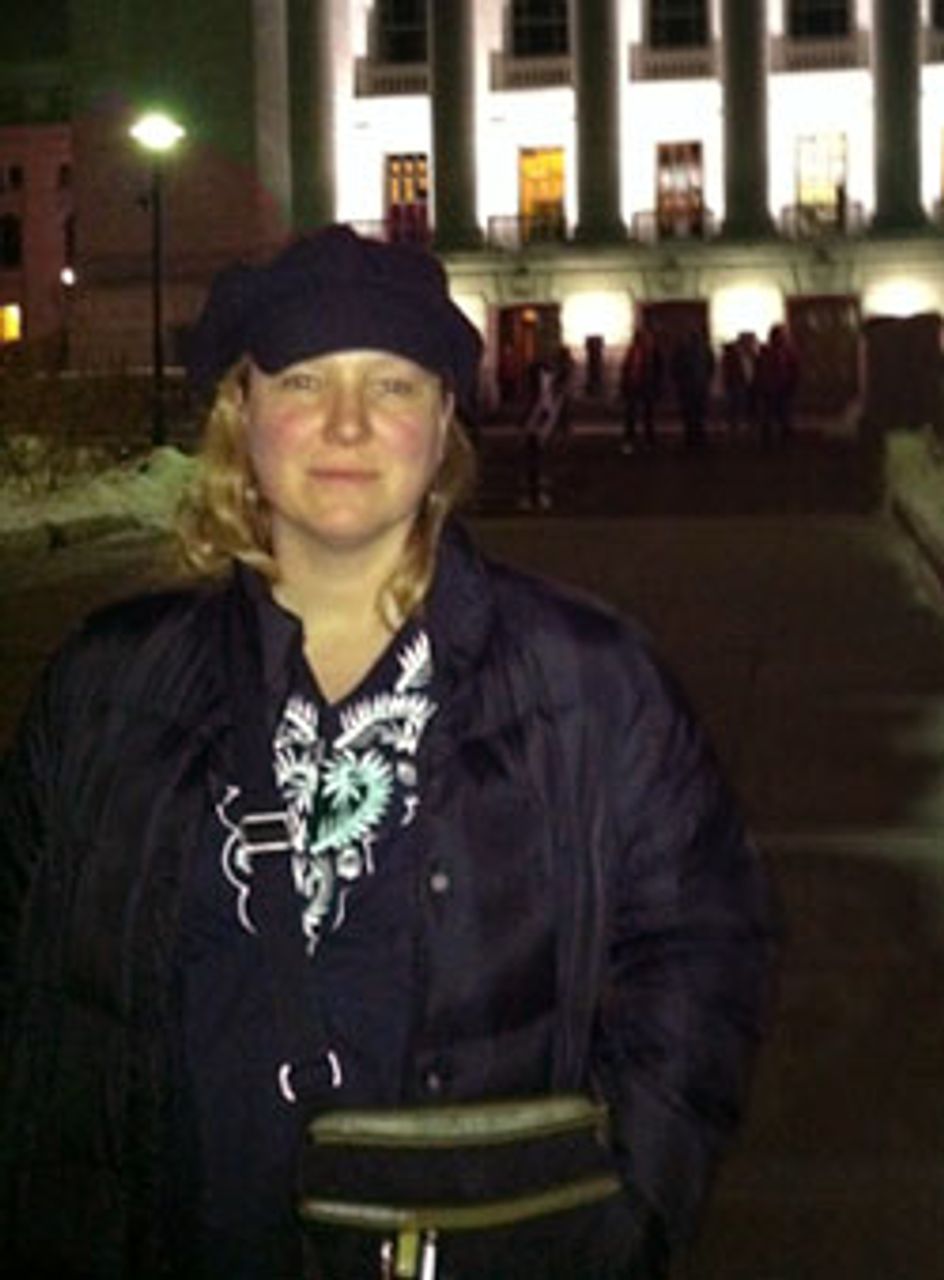 Kim
KimThe Duluth News Tribune reported that Jauch, in responding to the vote, “encouraged opponents of the bill to intensify their efforts to recall legislators who supported it,” adding that “he wouldn’t personally urge” a general strike. “You’re not going to get me to go there,” he said.
The WSWS spoke to some of those who gathered outside the capitol Wednesday evening. Kim, an art teacher, said, "We are not going to have art and music anymore because of this budget."
On the role of the Democratic Party, Kim said, "The Democrats had to know that what Walker did was a possibility. He had a stick and he's been hitting us with it. He's broken the social contract."
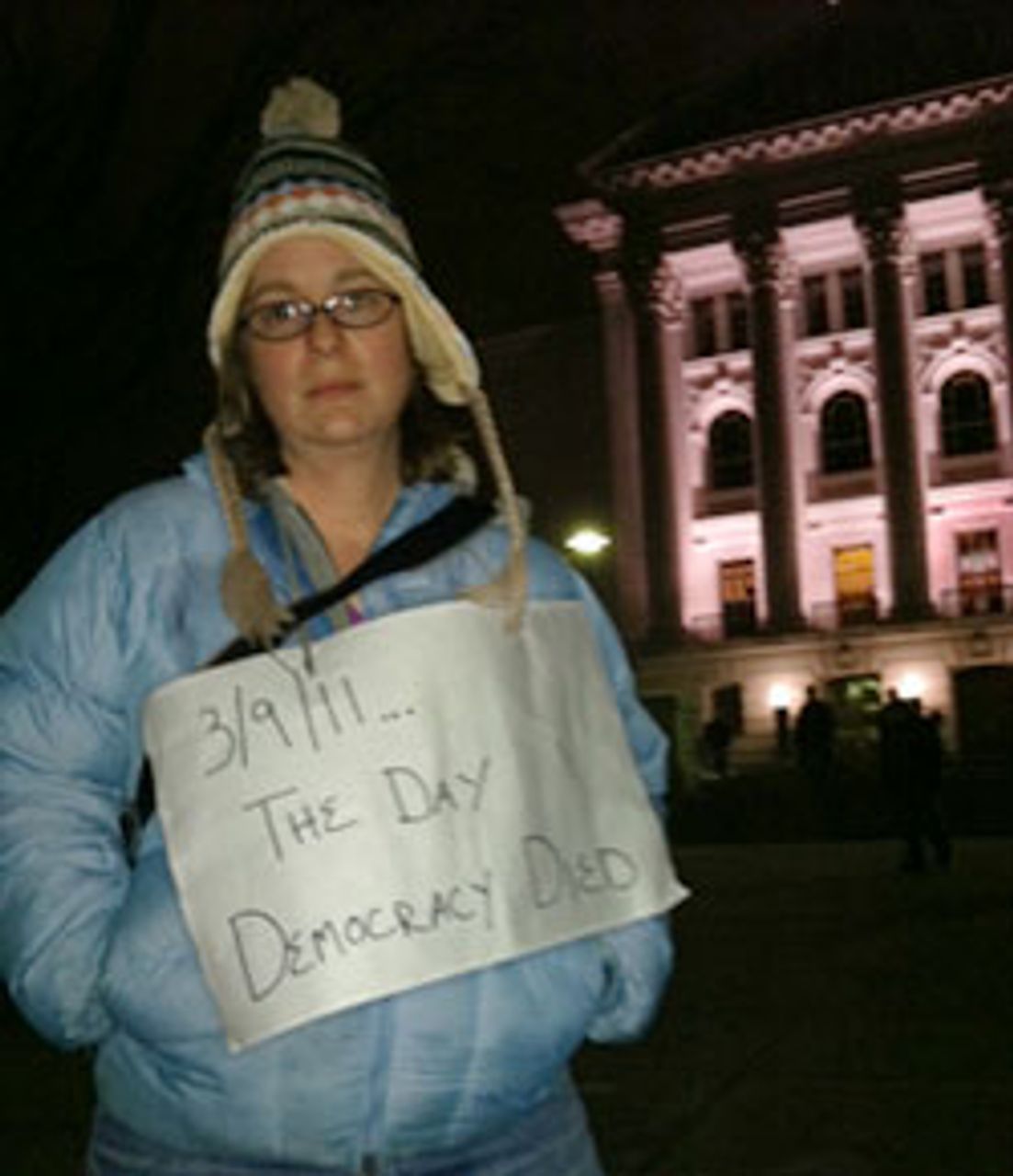 Beth
BethTeachers went on strike for four days, she said. "We went back to school thinking something was going to be worked out. I feel like my heart has been stomped on."
Beth, a network engineer at the department of corrections, agreed. "This is what plutocracy looks like. This is extreme capitalism. They take money from me to pay for Wall Street."
"They want all the talented workers to leave so they can say they failed and privatize them. I'm for a general strike. We can't let this stand."
